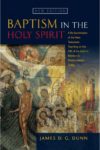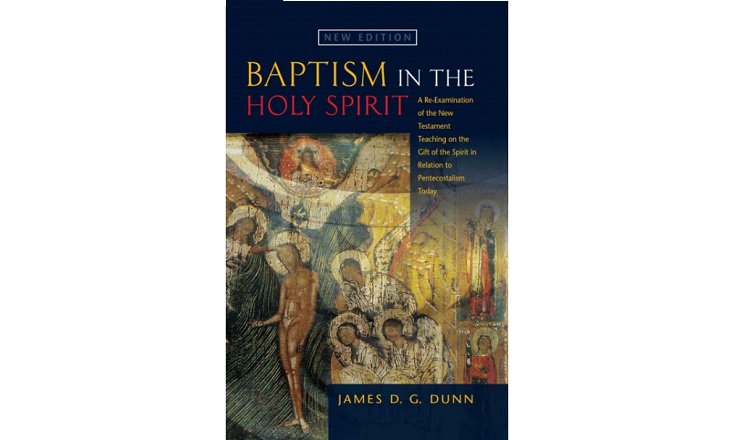 In this book James Dunn, one of the chief proponents of the New Perspective looks into baptism of the Spirit. It’s a study which engages in a multifaceted discussion with Roman Catholic, Protestant and Pentecostal positions.
In this book James Dunn, one of the chief proponents of the New Perspective looks into baptism of the Spirit. It’s a study which engages in a multifaceted discussion with Roman Catholic, Protestant and Pentecostal positions.
- Link: Amazon
- Length: 272
- Difficulty: Heavy-Academic
- Topic: Baptism
- Audience: Educated Christians, Academics
- Published: 2011
Having done some study on water baptism recently I found his study quite helpful in engaging with the Spirit’s role in gospel ministry, covenant membership, baptism, repentance and faith. I found the role of the Spirit lacking in many of the arguments surrounding baptism I have read.
In his own words;
I hope to show that for the writers of the NT the baptism in or gift of the Spirit was part of the event (or process) of becoming a Christian, together with the effective proclamation of the Gospel, belief in Jesus as Lord, and water-baptism in the name of the Lord Jesus;
that it was the chief element in conversion-initiation so that only those who had thus received the Spirit could be called Christians;
that the reception of the Spirit was a very definite and often dramatic experience, the decisive and climactic experience in conversion-initiation, to which the Christian was usually recalled when reminded of the beginning of his Christian faith and experience. (Loc 504)
He finishes up saying;
The gift of the Spirit (that is, Spirit-baptism) is a distinct element within conversion-initiation, indeed, in the NT, the most significant element and focal point of conversion-initiation. It is the gift of saving grace by which one enters into Christian experience and life, into the new covenant, into the Church. (Loc 4953)
This post is one of my book reviews.
Contents
- Preface to the Second Edition
- Preface to the First Edition Abbreviations
- I Introduction
- PART ONE
- II The Expectation of John the Baptist
- III The Experience of Jesus at Jordan
- PART TWO
- IV The Miracle of Pentecost
- V The Riddle of Samaria
- VI The Conversion of Paul
- VII The Conversion of Cornelius
- VIII The ‘Disciples’ at Ephesus
- IX Conversion–initiation in the Acts of the Apostles
- PART THREE
- X The Early Paulines
- XI The Corinthian Letters
- XII The Letter to Rome
- XIII The Later Paulines
- PART FOUR
- XIV The Johannine Pentecost?
- XV The Spirit and Baptism in John’s Gospel
- XVI The Spirit and the Word in the Letters of John
- PART FIVE
- XVII The Spirit and Baptism in Hebrews
- XVIII Conversion–initiation in Peter
- XIX Conclusion
Main points
As you can see from the contents, Dunn steps through the bible progressively looking at what the New Testament says about what he calls conversion-initiation, baptism and the role of the Spirit.
This review will just give a series of representative quotes for what I found to be the most interesting points he makes.
The baptism in the Spirit, in other words, is not primarily to equip the (already) Christian for service; rather its function is to initiate the individual into the new age and covenant, to ‘Christ’ (= anoint) him, and in so doing to equip him for life and service in that new age and covenant. In this Jesus’ entry into the new age and covenant is the type of every initiate’s entry into the new age and covenant. (Loc 989)
Note from above Dunn finds from the scriptures it is the role of the Spirit which initiates individuals into the new age and the covenant community. His argument makes sense of the scriptures and runs against the positions proposed by many who believe water baptism does this.
A more serious defect of too many modern treatments of baptism is their failure to appreciate the fact that baptism is only one element in the total complex event of becoming a Christian. To focus attention on baptism, and to examine only those passages which have immediate bearing on baptism necessarily distorts the total picture.
Most striking and most questionable is the way in which the gift of the Spirit is time and again subordinated to and interpreted in the light of baptism. Such treatments by their unbalanced approach immediately cause a question mark to be put against their conclusions. (Loc 2374)
Paul says in Romans 8;
Anyone who does not have the Spirit of Christ does not belong to him. (Rom 8.9)
Dunn quotes this and other passages in Paul to rule out the idea that water baptism makes people Christians and includes them in the body of Christ.
The seal of the Spirit is to be equated not with any external rite, but rather with the circumcision of the heart which was the token of the new covenant predicted by the prophets. And the point about the seal in business transactions is that the transaction is not completed until the seal is affixed.
Thus, in the ‘transaction’ of conversion-initiation it is impossible to say that the individual is a Christian until he has received the Spirit. The Spirit is the one who effects participation in the new covenant and in the Kingdom of the End – he marks the transition into the eschatological state. His coming effects and marks the change in ownership and lordship – his presence protects God’s property and makes it known as God’s. (Loc 2989)
Bringing Word and Spirit together, he then argues for the proper understanding of water-baptism in the context of gospel ministry and response.
The clear implication of this is that baptism is properly to be regarded as the expression of response to the gospel and the vehicle of commitment to the Lord. Yet we must not ignore the fact that it is the faith confessed and the confession of faith which results in justification and salvation, not the circumstances or manner in which it was made. (Loc 3330)
What Dunn says here gels with much of the baptisms we see in Acts. They were in response to hearing and believing the gospel.
Based on one interpretation of Col 2.11-12, the Calvinist position argues water-baptism is the new circumcision. Using this they argue water-baptism incorporates the baptizand into the covenant community, just as circumcision included Jewish boys into the Old Testament covenant. Dunn has a few things to say about that.
It is not baptism which is so contrasted with circumcision: Paul never says to his Jewish opponents, Our baptism is a more effective ceremony than your circumcision; rather he contrasts an outward rite with its corresponding inward reality. So here it is the spiritual, internal, invisible work of God in the heart of man on which Paul focuses. (Loc 3391)
and , now explaining how circumcision, baptism and Christ’s burial are understood in the new covenant.
It is important to grasp this point: that the fulfilment of circumcision is not baptism but the gift of the Spirit. Neither does baptism fulfil the prophetic hope of spiritual circumcision; only the Spirit does that.
Circumcision was not abrogated and set aside by Paul because a new rite of initiation had taken its place; he never and nowhere contrasts or compares the two.
Circumcision has been set aside because that which it looked forward to and pictured has taken its place – the circumcision of Christ – not only on the cross but also in the hearts of believers.
That is to say, baptism and circumcision are related not because baptism fulfils the hope of spiritual circumcision, but because both vividly depict Christ’s death and the reality of the spiritual transformation effected by the Spirit in the heart of the convert. (Loc 3469)
Dunn still retains the value of water-baptism in his argument. Overall he argues God comes to man through the Word of preaching and man comes to God in baptism. At the start and in several places throughout he argues water-baptism is the expression of faith and commitment.
Water-baptism is the means whereby the individual expresses his faith and commits himself to Jesus as Lord. But it may not be described as the means whereby God accepts him or conveys to him the Spirit. For Paul it is the Spirit who is the mark of God’s acceptance, and God’s instruments of saving grace are the Spirit and the gospel; the decisive act of grace is the gift of the Spirit to the faith expressed in baptism. (Loc 3817)
Recommendation
The book is short, but a heavy read.
Dunn assumes his readers can read and understand Greek. He often quotes words and simple expressions in Greek. That being said he does refer to the passage he is speaking about so it helps to look up the passage with an interlinear translation.
In addition to this he quotes extensively from other scholars who have written on the topic. Basically the book is for academics. Not for general lay readers.
All that being said, bringing in the Spirit into the debates about water-baptism is very helpful. It may free up some more room for further discussion between Catholics and Protestants, infant and believer baptists.
The book interacts with many passages put to service in arguing about baptism, shining a new light on them.
Copyright © Joshua Washington and thescripturesays, 2016. All Rights Reserved.





